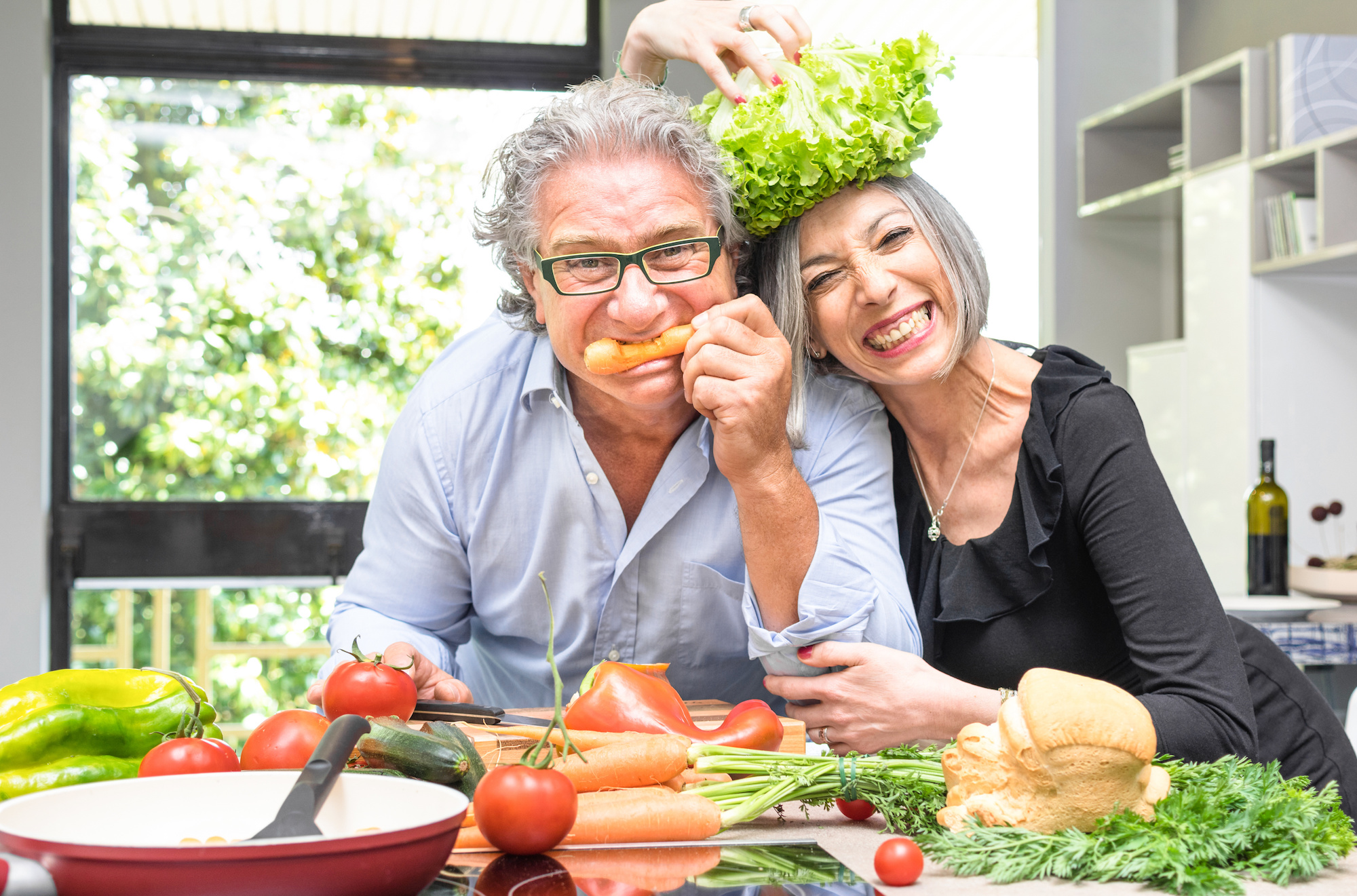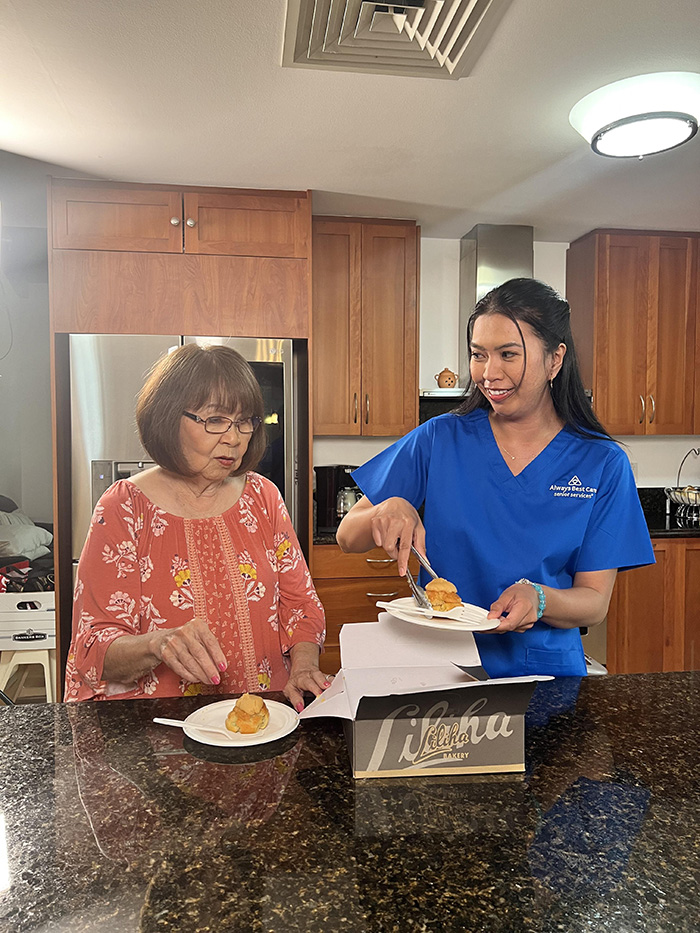What You Need to Eat as You Age

As you become older, you must make adjustments to your diet to maintain your health, thwarting diseases and ailments with proper nutrition.
Entering the senior years of life is a beautiful thing. Yes, you are not as fast and limber as you once were but there are also many people that are not lucky enough to make it to old age. Every year that passes should be treated as a blessing and a celebration.
Humans are living longer than ever, which means we have to place a larger focus on how we live our lives as seniors. In the 1950s in the United States, the combined average life expectancy for men and woman was 65 years of age. The current combined life expectancy in the US is about 79 years of age. If you live an active, healthy lifestyle, you might even expect to surpass your 80th birthday with ease. However, being active does not necessarily guarantee that you will age with grace- you must also ensure that your diet is aligned for your senior needs.
The Top 5 Diet Related Factors Seniors Need to Monitor:
- Manage Caloric Intake
- Ensure Sufficient Protein
- Avoid Fast Digesting Carbohydrates/Sugars
- Maintain Thirst by Getting Plenty of Water
- Boost Vitamins and Minerals With Colourful Fruits and Veggies
If you are entering the later stages of your life or if you have an aging loved in your life, you need to fully understand these 5 crucial senior diet related factors. Reading and understanding the topic is one thing but you also have to follow through with this information after you are done your research. Do you feel a little lost with this topic and need further, in-person assistance? Contact the Always Best Care South Torrance team today and learn more about Community Health and assisted living.
Table of Contents
1. Manage Caloric Intake
Think back to your younger years. As a child you didn’t walk anywhere; you ran, skipped and jumped! In school you played sports and took part in gym class. As you got a little older, you rushed from your job to your children’s music lessons, the bustle of life always keeping you on your toes.
As we enter the later stages of life, we often slow down. We are less active than we used to be, which means we burn less calories. If you burn less calories, you don’t need to intake as many either. Many seniors need to adjust their diets and reduce the total amount of calories they are consuming in a day.
How many calories should you be intaking? As a general rule of thumb, woman over the age of 50 need about 1,600 calories per day if they are quite sedentary and up to 2,000 calories if they are active. Men are typically a little larger in size and therefore require a little more food. Men over the age of 50 need about 2,000 calories per day if they are not active and up to 2,400 calories if they participate in any sort of regular exercise or rapid movements. These figures are generalization of course. In any stage of life, consulting with a health professional is extremely important when it comes to proper caloric intake, especially for seniors who may have delicate health issues.
There are some seniors that lose their sense of smell and taste as they age, and with their senses they lose their appetite. In these cases, the loved ones and professionals in the seniors life will need to ensure that they consume enough calories to stay healthy. Calorie dense foods such as nut butters, coconut products, potatoes and avocados can help an underweight senior regain their figure and natural vigor.
2. Ensure Sufficient Protein
One of the most common causes of injuries in seniors is impacts around the home that result from falls. As we age, the amount of muscle on our bodies decreases and so does our strength. Not only does this make it harder to hold ourselves up, or stop ourselves from falling, but when we do fall our bodies are weaker than we are accustomed to leading to serious injuries including broken bones.
It is not enough to simply consume the right amount of calories, seniors must also ensure that they are getting enough protein in their diet to stay strong. Having muscles on our body gives us strength but it also helps us stay lean!
What are the best high protein foods to add to a seniors diet? Lean animal proteins such as chicken and fish, nuts, beans, and dairy products are all fantastic sources of useful protein. There are also many supplementary beverages on the market now that help seniors reach their protein and calorie goals- bonus, they usually taste great!
3. Avoid Fast Digesting Carbohydrates/Sugars
When we are children, we often crave sugary foods and get a steady supply of them all year long. At Christmas we get cookies, Halloween brings chocolate and Thanksgiving always ends with pumpkin pie. As we age, we cannot consume these foods on a regular without drastically increasing the risk of diabetes and Alzheimer’s disease. The truth is, no one should be consuming these foods often, regardless of our age. Obesity is an epidemic in our country, so even if you are avoiding sugary foods to help fight off dementia related diseases, you should also be committing to a sugar-free life to set an example to those younger than you. Your grandchildren will thank you down the road.
4. Maintain Thirst by Getting Plenty of Water
Intaking the correct amount of water is one of the easiest and most important changes a senior can make to their diet. How much water do we actually need to consume? Most health professionals recommend about 2 litres, or 8 glasses filled with 8 ounces of water per day. An easy way to remember the 8 glasses of water is by calling it the “8×8 rule”. This might seem daunting at first if you currently don’t drink that much water in a day but it will become much easier if the glasses are spaced out throughout your day.
Tip -> One of the easiest ways to wake up in the morning is to hydrate your body. Keep 16 ounces of water by your bedside, or 2 of your 8 ounce glasses and drink them as soon as you rise. Throughout the night, your body becomes dehydrated making it even more difficult to rise in the morning, but when you flood your body with water, all of your systems will kick into gear!
Why must we drink so much water? Staying hydrated keeps your organs functioning at optimal levels, flushes toxins out of the body and improves brain function- all very important, especially as we age.
5. Boost Vitamins and Minerals With Colourful Fruits and Veggies
If a senior loses their sense of appetite or it becomes more difficult for them to cook, the amount of fruits and vegetables in their diet may significantly decrease. This can quickly spell trouble for an elderly person- the vitamins and minerals that fresh produce provide are extremely important for basic bodily functions, a healthy brain, and fighting off sicknesses.
Seniors should incorporate as many nutrient-dense produce items as possible. Some of the best choices at the grocery store are dark leafy greens such as spinach, broccoli, red peppers, brussel sprouts, carrots, tomatoes, strawberries, radishes, blackberries and grapefruit.
If you follow these 5 principals at any stage of your life, you will be healthier and more vibrant. Set an example for your family and friends and incorporate these simple actions into your daily schedule and get ready to feel better than you have in years!
Are you still looking for additional information on what a seniors diet should look like, or other care related issues?





